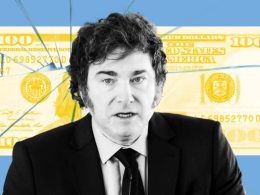Unlock the White House Watch newsletter for free
Your guide to what the 2024 US election means for Washington and the world
It was Treasury Secretary John Connally who famously quipped in the 1970s that the US dollar was “our currency, but your problem”. Today, investors around the world could just as easily replace “currency” with “interest rate”, “stock market” or “geopolitical strategy”. Donald Trump’s win changes all of these, and more.
With US stocks making up over two-thirds of global markets, the impact of a second Trump term on equity portfolios is hard to avoid. While UK investors’ direct equity holdings may skew domestic, most pension holdings are invested globally, and most of these end up in US stocks.
Last time Trump was elected US stocks rallied. Much of this was simple maths. Trump campaigned in 2016 on a pledge to slash the corporate tax rate from 35 per cent to 15 per cent. His surprise victory saw stocks reprice to capture the earnings kicker, even if he managed only to cut the rate to 21 per cent.
This time round, Trump has again pledged to cut the corporate tax rate to 15 per cent. But market expectations of a Republican win have been higher, and the potential earnings kicker more modest.
Still, US stocks have reacted well so far, with returns from smaller companies especially buoyed by promises to deregulate and to stifle international competition by way of substantial tariffs. Furthermore, Trump’s economic agenda involves reducing federal tax revenue by $3tn from 2025 to 2034, according to the non-partisan Tax Foundation, boosting growth. So even without a substantial corporate tax giveaway, this magnitude of overall stimulus looks good for earnings. The risk to a stronger US stock market comes, however, from the bond market.
Unlike the stock market, the US bond market has hated the result of the election. Yields of short and long-dated bonds jumped, pushing prices lower. This is because tariffs boost inflation, as do larger budget deficits, and lower immigration, complicating the Federal Reserve’s plan to cut interest rates rapidly through 2025.
If Trump succeeds in imposing a universal 20 per cent tariff on all imports and raising the tariff on imports from China to 60 per cent we can expect interest rates to be higher for longer. And without a steady diet of rate cuts, bond valuations will continue to sink.
What Trump means for your money
UK investors and mortgage borrowers are likely to feel the effect of new White House policies. Read here
This matters to every investor, regardless of their exposure to US bonds. As the global monetary hegemon, US bond yields have huge bearing on how interest rates are set across the globe. At some point higher interest rates could also start to undermine equity valuations, which are historically rich. Indeed, Goldman Sachs was already looking for this richness to unwind, providing investors a return from US stocks of only 3 per cent a year over the next decade.
Away from US stocks there’s less for investors to be cheerful about. Tariffs designed to bash the earnings of foreign firms could do just that. Chinese equities were boosted this year by government stimulus, and several analysts speculate that further support will be forthcoming to Chinese firms to offset the expected hit from tariffs. But it’s harder to make a bull case for European stocks out of the election result.
The currency impact of Trump’s policies are almost as important as the asset price effects. Economists theorise that US tariffs strengthen the dollar, and markets largely agree. So for a European investor, the buck is likely to bring more bang. Barclays believe the extent of forthcoming appreciation will be in the mid-single digit percentage points.
Of course, Trump’s approach to European security, the Middle East and Taiwan have the potential of being significantly more important than tax changes for both markets and the world. There’s just so much we still don’t know.
The author is an independent analyst and a contributing editor of the Financial Times
Source link









